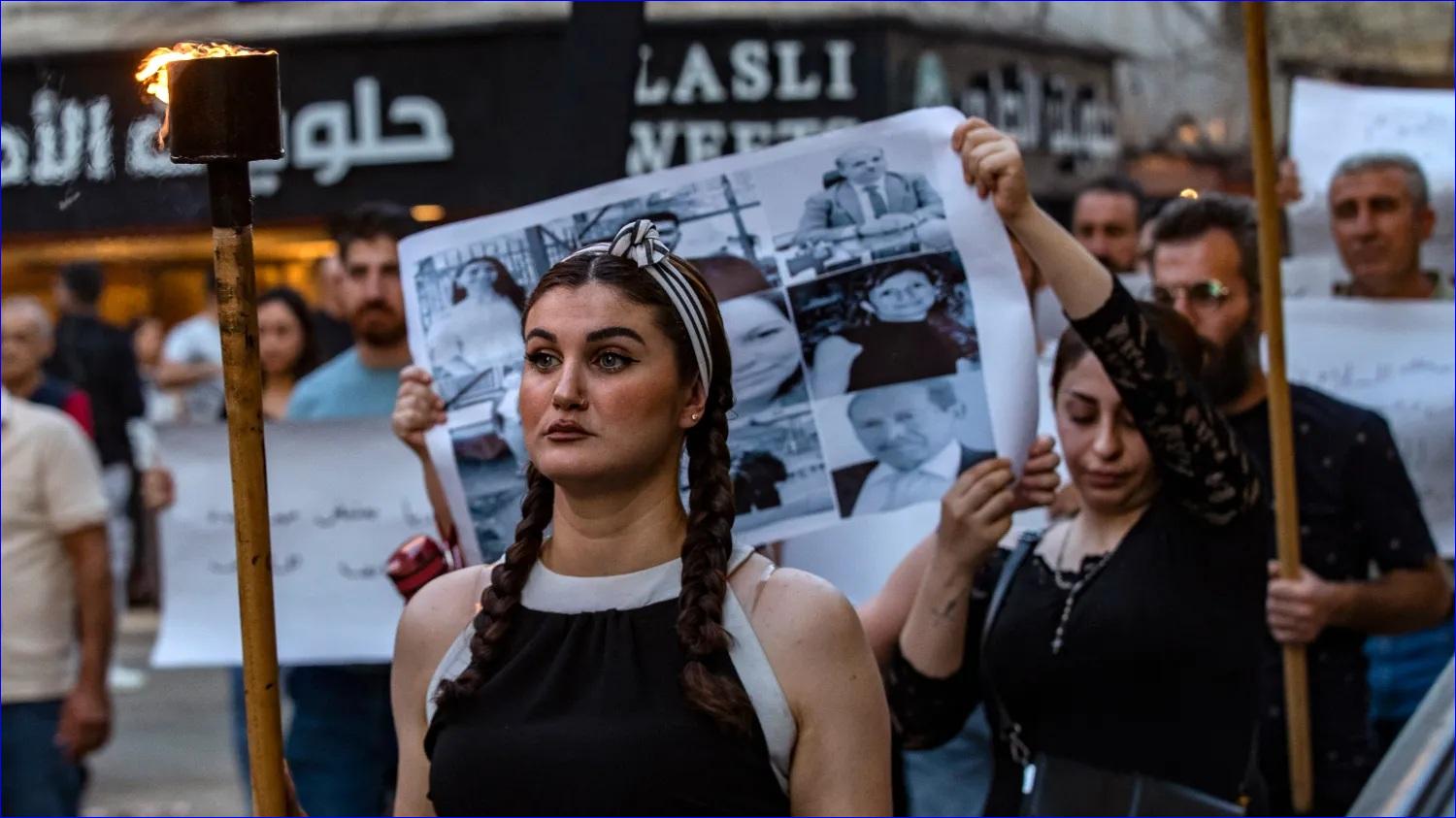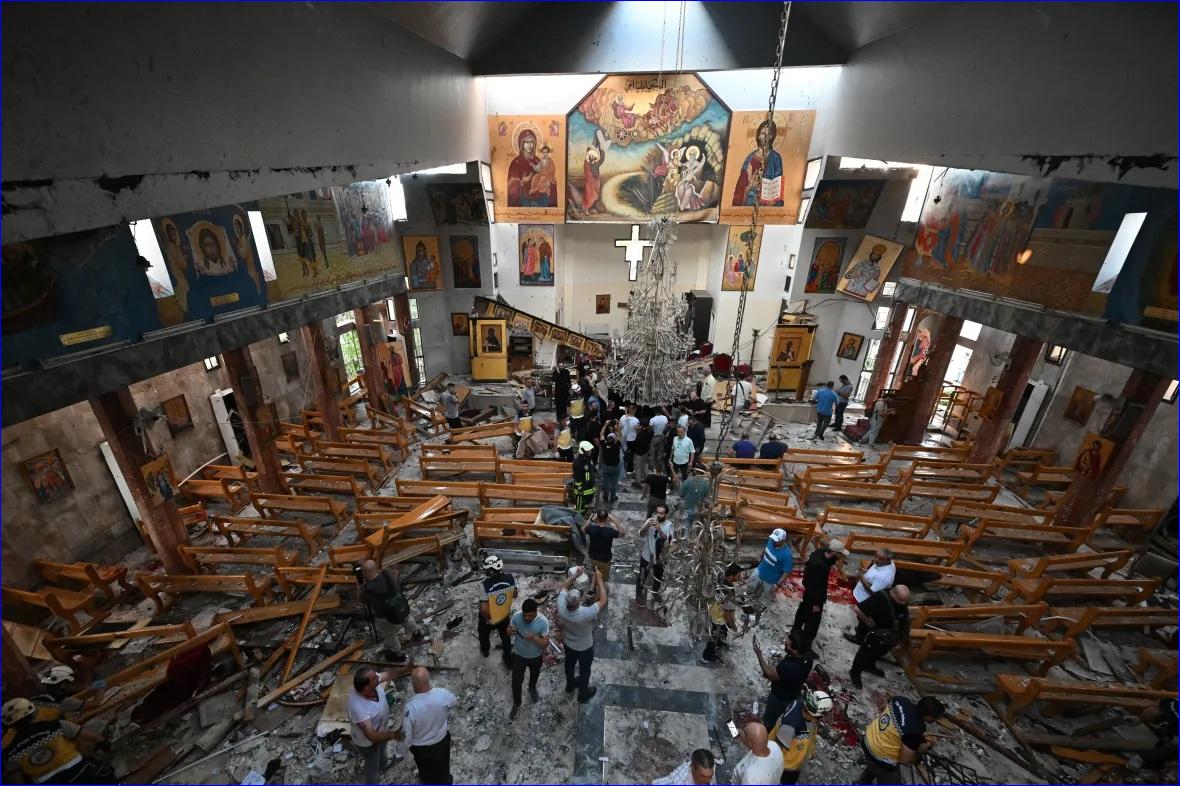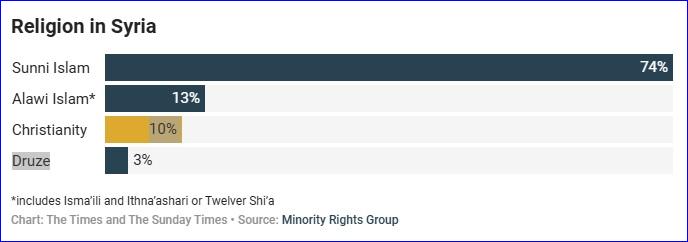


 Delil Souleiman/AFP/Getty)
Delil Souleiman/AFP/Getty)
Related: Timeline of ISIS in Iraq
Related: Attacks on Assyrians in Syria By ISIS and Other Muslim Groups
The blast ripped through the congregation of 250, ending the church service that had started just 15 minutes earlier with the roar of the explosion, splintered wood, scything shrapnel and tumbling icons. The dead and the dying fell among the scattered pews, their blood splattering the walls above the altar and pooling across the floor.
As the dust and smoke cleared, the cries of the wounded rose from the wreckage. Twenty-five died, a further 63 injured. The casualties included children.
Sunday evening's attack on the Saint Elias church, in the Dweil'a district on the southern outskirts of the Old City in central Damascus, caused the worst single loss of life among Syria's Christians since the fall of Bashar al-Assad seven months ago.
Condemned by international leaders, the United Nations, the Arab League and high-ranking clergy from around the world, the massacre poses specific challenge to the authority of the new president, Ahmad al-Sharaa, just six weeks after the commander of the former al-Qaeda affiliate Hayat Tahrir al-Sham (HTS), shook hands with President Trump in Riyadh and the US lifted its sanctions on Syria.
Despite his own extremist origins, Sharaa, whose HTS forces swept to power last December, has since vowed to establish a tolerant, multi-ethnic state, and has attracted western support with an "it's me or the abyss" style call for foreign backing.

 Louai Beshara/AFP/Getty Images)
Louai Beshara/AFP/Getty Images)
Indeed, the Syrian leaders's ability to guarantee security for the country's mosaic of different beliefs is seen as the litmus test for his ability to rein in the more extremist elements among the forces which he led to power.
After months of prevarication the US has thrown its support behind the new president. Although the UK continues to regard HTS as a proscribed terrorist organisation, its has established contact with the new Syrian government, lifted sanctions against Syrian ministries and intelligence agencies and pledged up to £160 million in aid to help stabilise Syria following the fall of the Assad regime.
With so much riding on the security of Syria's minorities, and amid the febrile sectarian tensions that have seen hundreds die in two waves of killings since March, a fight has now erupted over the narrative of the Saint Elias church massacre, as different Syrian groups are accused of responsibility, deny responsibility or else claim credit for the Sunday mass killings.
In the immediacy of the attack, the Syrian interior ministry first blamed Islamic State. Within 48 hours it had announced a number of arrests of IS members, in addition to claiming to have foiled two further IS bomb attacks against the Sayyida Zaynab Mosque and the Convent of Saint Thecla in Maaloula.
However, IS, which is believed to have between 1,500 and 3,000 fighters spread across Syria and Iraq as well as 9,000 male detainees in Syrian prisons, made no claim of responsibility for the church massacre.
Instead, on Tuesday a little-known Syrian Sunni extremist group -- Saraya Ansar al-Sunna, which translates as "squadrons of the supporters of the Sunna" -- claimed the attack, releasing a detailed statement that named the suicide bomber as a Syrian, Muhammad Zain al-Abidin Abu Uthman. The group denied any formal affiliation with IS, refuted the government's claim that IS was responsible and threatened more attacks.
More embarrassingly for the Syrian government, Ansar al-Sunna claimed to originate not from Islamic State, but out of a core of disaffected HTS members, who split from Sharaa's forces during the downfall of Assad.
Based on earlier research into the group by the leading British-Iraqi analyst Aymenn al-Tamimi, which included Tamimi's interview with the lead cleric of Ansar al-Sunna, Dr Abu al-Fath al-Shami, it now appears that the commanders of the extremist group formerly ran an undercover HTS recruitment department during the conflict with the Assad regime.
After Assad fled Syria, Ansar al-Sunna leaders grew angry with the victorious HTS leadership for their failure to establish Islamic Sharia law throughout Syria, and declared Sharaa's government apostates.
Similar to IS, the extremist group obliged Christians either to convert to Islam, pay "jizya" tax or be slain. In the statement released by Ansar al-Sunna on Tuesday claiming responsibility for the church massacre, the group framed the bombing as a response to a ban by the Syrian government on the practise of "da'wa" -- Islamic proselytising -- in the Christian Dweil'a area of Damascus.
Unabashed by the new group's claims just hours after Ansar al-Sunna's claim of responsibility, the Syrian interior ministry responded by denouncing Ansar al-Sunna as a false flag for IS, and spread the circle of blame by insisting that the church suicide bomber and his IS accomplice had deployed to Damascus from the Al-Hol camp in the northeast of the country, which is controlled by the Kurdish-led Syrian Democratic Forces (SDF).

Packed with families linked to IS after the extremist group's defeat in Syria by the SDF in 2019, the al-Hol camp now has a population of about 40,000. Though the SDF -- one of the most powerful armed formations in Syria and a long-time foe of all Syrian jihadist groups -- signed an agreement with Sharaa in March to integrate their forces and institutions into the control of Damascus, tensions between the two sides remain.
Though the SDF has never managed either to fully secure Al-Hol camp, or get an accurate nominal role of those detained there or prevent IS commanders from entering and leaving the camp clandestinely, it nevertheless issued a counter-statement, rejecting the interior ministry claims, which amounted to a political smear of implication in the church massacre.
In essence, within just three days of the murder of 25 Christians in a church service in the middle of Damascus the Syrian government had blamed IS for the attack; had then itself been indirectly implicated by a different terror group which did claim responsibility for the bombing; and had then suggested the claimant group was a false flag, instead accusing Syrian Kurds of indirect implication through negligence.
Caught in the middle of the politicised furore, Syria's Christians have been left feeling far from reassured.
"We are a fundamental part of this country, and we will remain so," said Patriarch John X, the Syrian head of the Greek Orthodox church, addressing Sharaa while speaking at the funeral for the dead. "We congratulated you upon your election. We offered our help in building the new Syria. Sadly, we are still waiting for you to see that hand."
"We want to know who is behind this heinous crime," the patriarch added. "We were promised that we would find out. Beyond that, however, the government bears full responsibility. Our people want security and peace. The government's foremost duty is to ensure the safety of all citizens, without exception or discrimination."

or register to post a comment.